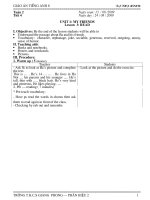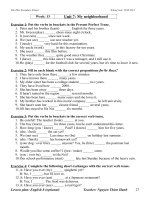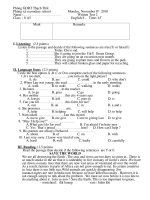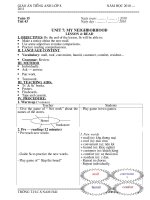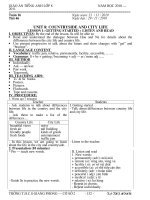anh 8 tuan 19
Bạn đang xem bản rút gọn của tài liệu. Xem và tải ngay bản đầy đủ của tài liệu tại đây (136.25 KB, 7 trang )
Week : 17
Period: 49
Date of preparing: 12/12/2018
Date of teaching: 15/12/2018
UNIT 8: COUNTRY LIFE AND CITY LIFE
LESSON 3: READ
I. OBJECTIVES:
- By the end of the lesson, students will be able to understand the text about of the
problem of people from the countryside moving to the city.
II. PREPARATIONS: Textbook, sub-board
III. PROCEDURES:
TEACHER’S ACTIVITIES
1/ Warm-up: (6’)
Chatting
- Ask Ss to answer some questions.
1. Do you prefer the country life or the city life?
2. Do you like moving to the city? Why?
- Lead to the lesson.
2/ Pre-reading: (14’)
- Teach vocabulary.
I. Vocabulary:
rural (adj): thuộc về nông thôn urban (adj)
strain: quá tải
Plenty (adj): nhiều
tragedy: bi kịch
(to) struggle: đấu tranh
migrant: dân di cư
(to) increase: tăng lên
- Check vocabulary: R.O.R
3/ While-reading: (15’)
Activity 1:
- Ask Ss to read the passage and find the word has
the same meaning with the phrases.
II. Read
1. Find the word in the passage:
a. of the countryside
rural
b. as many as needed
plentiful
c. become greater or larger
increase
d. a great pressure
strain
e. a terrible event
tragedy
f. of the city or city life
urban
Activity 2:
- Ask Ss to read the text again and answer the
questions.
STUDENTS’ ACTIVITIES
- Answer the questions.
(sentence 1: for bad ss)
- Listen.
- Listen, guess the meaning and read.
- Do as directed.
- Work in pairs.
- Work in groups to answer the
questions.
2. Answer the questions:
a. Are many people leaving their home to the city?
b. Does the city offer more opportunity?
c. What do many people coming to the city create?
d. What may the city not be enough?
4/ Post-reading: (8’)
- Ask Ss to read the passage again, and complete
the summary.
1. leaving
6. problems
2. home
7. schools
3. city
8. hospitals
4. rural
9. problem
5. city
10. world
- Call some Ss to present their result.
5/ Homework: (2’)
- Have Ss:
+ Learn vocabulary by heart.
+ Read the passage and do the tasks again.
a. Yes, they are.
b. Yes, it is.
c. They create problems.
d. schools and hospitals.
- Work with the partner.
- Present the answer.
- Write assignments.
IV. COMMENT:
........................................................................................................................................
........................................................................................................................................
........................................................................................................................................
........................................................................................................................................
........................................................................................................................................
........................................................................................................................................
........................................................................................................................................
........................................................................................................................................
Week : 18
Period: 50
Date of preparation: 18/12/ 2018
Date of teaching:
21/12/ 2018
UNIT 8: COUNTRY LIFE AND CITY LIFE
LESSON 4: WRITE
I. OBJECTIVES:
- By the end of the lesson, students will be able to write letters to their friends about their
neighborhood.
II. PREPARATIONS: Book, sub-board
III. PROCEDURES:
TEACHER’S ACTIVITIES
1/ Warm-up: (6’)
Ordering
- Ask Ss to put th outline for an informal letter in the
correct order.
Opening
Date
Closing
Heading
Writer’s address
Body of letter
- Lead to the lesson.
2/ Pre-writing: (14’)
- Ask Ss to answer some questions to help them write
the body of the letter.
1. Where do you live? (bad ss)
2. What does your house look like?
3. What can you see from your bedroom window?
4. How far is it from your home to school? How do
you get to school?
5. What kinds of facilities are there in your
neighborhood?
6. What things in your neighborhood do you like best?
Why?
3/ While-writing: (15’)
- Ask Ss to write letters to friends about their
neighborhood.
- Have Ss share their letter to the partner.
STUDENTS’ ACTIVITIES
- Write in a piece of paper, then hang
on.
+ Heading: Date, Writer’s address
+ Opening
+ Body of the letter
+ Closing
- Listen.
- Answer the questions individually.
1. I live in a small town/ village.
2. My house is very nice/ small.
3. From my bedroom window, I can
see many green trees and colorful
flowers.
4. It’s far from my home, so I have to
ride my bike / It’s very near so I can
walk.
5. There is a post office and some
restaurants in my neighborhood.
6. I like the library best because I can
read many interesting books, or study
there/ I like the stream best because I
can swim with my friends there.
- Write individually.
- Exchange the letter.
- Call 2 Ss to write their letter on the board.
Dear … ,
I live in a small town. My house is very nice. From
my bedroom window, I can see many green trees and
colorful flowers. I don’t live far from my school, so I
can walk there.
In my neighborhood there is a post office and some
restaurants. I like the stream best because I can swim
with my friends there.
Is there any intersrting where you live? Write to me.
I’m looking forward to hearing from you.
Love,
……
4/ Post-writing: (8’)
- Ask some Ss to read their letter aloud
5/ Homework: (2’)
- Have Ss:
+ Rewrite the letter.
+ Prepare “Language focus”
- Write the letter.
- Listen and comment.
- Write assignments.
IV. COMMENT:
........................................................................................................................................
........................................................................................................................................
........................................................................................................................................
........................................................................................................................................
Week: 18
Period: 51
Date of preparation: 19/12/2018
Date of teaching:
22/12/2018
UNIT 8: COUNTRY LIFE AND CITY LIFE
LESSON 5: LANGUAGE FOCUS
I. OBJECTIVES: By the end of the lesson, students will be able to:
- Use Present Progress to talk about the future and to show changes with get and
become.
- Use comparatives and superlatives of adjectives.
II. PREPARATIONS: Books.
III. PROCEDURES:
Teacher’s activities
1. Warm – Up: (5’)
- Have students match the verbs in column A and the
phrases in the column B
A
B
1. play
a. cold
2. visit
b. at 6.30 am
3. leave
c. soccer this afternoon
4. arrive
d. grandparents next week.
5. become
e. on time tomorrow.
Students’ activities
- Pair works.
1+c , 2+d , 3+b , 4+e , 5+a
(1,2: for bad ss)
2. Exercises: (35’)
a/ Exercise 1: Present progressive tense with future
meaning
- Ask students to do the exercise 1 on the page 77.
- Call on some pairs to practice the dialogues.
b/ Exercise 2: Present progressive tense
- Ask students to match the verbs on the left and the phrases
on the right.
1. play
a. a meeting
2. do
b. to a violin lesson
3. watch
c. the house
4. go
d. table tennis
5. clean
e. a program
6. have
f. homework
- Ask students to complete the dialogue on the page 78 with
the suitable verb phrases above, using the Present
Progressive tense.
- Have students give feedback.
a. am playing
d. am going
b. are doing
e. are cleaning
c. am watching
f. am having
c/ Exercise 3: Present progressive tense with get and
become
- Set the situation:
“Hoa’s grandmother is 78. five years ago, she was stronger
than she is now. So she is getting weaker now”
- Ask students to do the exercise 3 on the page 78, using the
structure above.
- Have students give feedback.
a. The boys are getting taller.
b. The old men are becoming weak.
c. We should go home. It’s getting dark.
d. The weather is getting cold.
e. The students are getting better.
f. The school-yard is becoming cleaner.
d/ Exercise 4: Comparison
- Ask students to find out which are short adjectives and
which are long adjectives
- Get students to write them on the board.
Short adjectives
Long adjectives
Hot
Expensive
Old
Accessible
Small
Beautiful
Busy
Convenient
Easy
Difficult
- Individual work.
- Practice the dialogues in pairs.
- Individual work.
- Pair works.
- Give feedback.
- Listen.
- Individual work.
- Give feedback.
- Group works.
- Write on the board.
Cheap
Intelligent
- Ask students to do the exercise 4,5 on the page 79 in pairs
to make comparisons between the city and the country with
the given words and adjectives.
exercise 4:
a. The food in the city is more expensive than in the country.
b. The school in the city is bigger than in the city.
c. Electricity in the city is better then in the country.
d. The entertainment in the country is poorer in the country.
e. The traffic in the city is busier than in the country.
f. The transport in the country is worse than in the city.
-Ask students to do the exercise 5 in pairs.
4. Consolidation: (3’)
-Remind structure present progressive tense and
comparison.
5. Homework: (2’)
- Have ss:
+ Redo the exercises in the exercise notebooks.
+ Prepare next lesson: Review
- Group works.
exercise 5
a. The villa is older than the
apartment.
b. The house is more expensive than
the apartment.
c. The villa is bigger than the
apartment.
d. The apartment is smaller than the
villa.
e. The apartment is hotter than the
house.
f. The house is the biggest.
e. The villa is the most beautiful.
f. The villa is the oldest one.
- Pair works.
-Listen.
-Take note.
IV. COMMENT:
........................................................................................................................................
........................................................................................................................................
........................................................................................................................................
........................................................................................................................................



